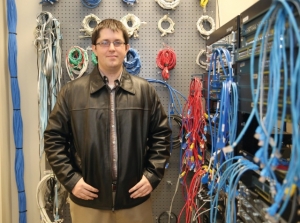Student picked for NASA program
By Kirsten Ballard
Published in News on March 25, 2015 1:46 PM

News-Argus/MELISSA KEY
Craig Bennett II, information and technology student, stands in the Wayne Community College networking lab. Bennett has been selected to participated in NASA's Community College Aerospace Scholars project this spring.
Craig Bennett II has always loved space.
This May, he is one large step closer to exploring the final frontier.
The Wayne Community College student has been selected to travel to NASA's Johnson Space Center this spring to participate in the NASA Community College Aerospace Scholars project. He is the second student from Wayne Community College to attend the program.
Bennett will visit the Stennis Space Center in Mississippi from May 17 to 19. He was one of the 240 community college students nationwide to be selected for the program.
Bennett is studying information technology and networking at WCC. He is in his second year at the college. He previously earned a degree in aerospace from Brevard Community College and a bachelor's degree in computer software engineering from North Carolina State University.
The NCAS program is five weeks. Bennett applied to the program at the beginning of the year and spent January and February learning extensively about Mars.
"Mars has water in the atmosphere but not oxygen," he said. "If we can tetraform (change) the atmosphere to what we desire..."
He lights up when he talks about the possibilities of Mars exploration.
In his application to the program, he proposed a hypothetical mission and 3-D rover that would explore the valleys and cave system of the red planet.
He believes strongly in space exploration, especially in exploring the possibilities of sustaining life on other planets.
"The truth of the matter is one day, we've got to leave. We've got to walk before we run," he said.
In the future, Bennett said it would be possible to use Mars as a test point for further exploration and the moon as a launch pad.
"We're a ways off from that," he laughed.
According to Bennett, people are reaping the benefits of space exploration in day-to-day life as the technological gains from NASA are re-purposed for consumer use, whether it is the hand-held vacuum or shock blankets for marathon runners.
In the past, he spent time at the Kennedy Space Center in Florida and is looking forward to comparing the history of the two programs.
"I'm hoping to come back with a network and more knowledge on the subject (of Mars)," he said.
For NCAS, Bennett learned about Mars' atmosphere, geography and rover history. He describes it as a semester of information in a week. His previous studies in aerospace gave Bennett a leg up in learning about the automechanics of the Mars rover.
In May, Bennett will attend a three-day, on-site event at Stennis Space Center. The NCAS students will interact with engineers and learn about careers in the field. They will form teams and establish fictional companies interested in Mars exploration.
Each team will develop and test a prototype rover, form company infrastructure, manage a budget and develop communications and outreach.
"I'm most excited about getting to play with the equipment," he laughed.
